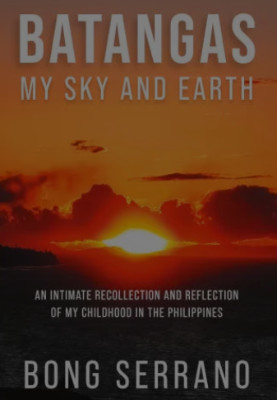January 1, 2024 — Vancouver resident Bong Serrano started writing in the early 1990s. He would jot down his memories of life in the Philippines on pieces of paper, napkins, and even airplane menus. After Facebook became popular, he continued doing this on a section of the social-media site called “Notes”.
“That was my way of sharing my stories with my brother,” Serrano tells Pancouver.
However, in 2014, Serrano noticed there was something terribly wrong with his sibling, Boying, when they were travelling together in Las Vegas. At that time, Boying shuffled along slowly and unsteadily. He paid no attention to the noise of slot machines in the casino.
“It was just beginning to dawn on me how clueless I had been the last few days,” Serrano writes in his book, Batangas: My Sky and Earth.
“My heart gave an unexpected lurch, and I slowed my stride to match my brother’s, narrowing the gap between us,” he continues. “The sudden realization cast a pall over the remainder of the walk.”
Boying, whom Serrano lovingly calls “Kuya” (Older Brother), was suffering from kidney cancer. Later that year, Serrano visited his very ill sibling in the Philippines.
“I knew then that I was going to lose my brother,” Serrano says. “We were preparing ourselves for that reality.”
Serrano realized that he needed to record his memories about Boying. Otherwise, these recollections would be lost forever. And after Boying passed away, it became Serrano’s mission to write a book about their family life in the province of Batangas on the northern island of Luzon.
“Culture is what is remembered in terms of our practices and how we live our lives,” Serrano says. “And it’s a family culture that I really wanted to preserve.”
His ambitious, 426-page book is billed as “An Intimate Recollection and Reflection on My Childhood in the Philippines”. It took nearly eight years to write and has 41 chapters touching on a wide range of experiences. They include stories about his family trips to communities in Batangas, his family’s old ancestral house, and tales about various relatives in addition to Boying.

Bong Serrano
“What I really want to impart here is that I really love my brother,” Serrano says. “I still love him very much.”
In the book, he shares memories of his grandmother’s habit of chutta, a.k.a. “reverse smoking”, which involves putting the lit end in one’s mouth. Sadly, she contracted oral cancer. There’s also an explanation of many customs common in the Philippines, including pagmamano, which is a gesture of respect shown to elders.

Through countless other anecdotes, Serrano conveys what life was like for him and his siblings growing up in Batangas. He even included a glossary of Tagalog terms in the book.
The dedication reads: “To my dearest brother, Kuya Boying, who once gave me a great pair of shoes. Without them, I wouldn’t have had the courage to pursue wonders beyond my sky and earth.”
Two central figures are Serrano’s mother, Crispina, and his father, Cayo. The author affectionately refers to them as Inay and Tatay.
“Nothing was more important than raising their kids,” Serrano emphasizes. “Even their careers couldn’t get in the way of their six children.”
His mother was a talented opera singer who graduated from the Centro Escolar University School of Pharmacy in 1943. His father earned a law degree in 1957 from Western Philippine College. According to Serrano, their passion for education is shared by many Filipinos.
“We all have the same common belief system that education is one of the most important investments that we have in life,’ Serrano states. “That can prepare us anywhere we go in the world—not just in the Philippines but also outside of the country.”
Both of his parents lived through Japan’s brutal occupation of their country during the Second World War. His father was in the resistance, enlisting as a guerilla soldier with Philippine Scouts.
On one road trip, Serrano’s mother revealed that during the war, she saw country folks being killed en masse by Japanese soldiers in the city of Lipa.
“They were being pierced with a bayonet—and she witnessed all of this with her own eyes,” Serrano states.
Yet in the book, Serrano also tells a heartwarming story about a former Japanese Imperial Army officer who moved to his father’s hometown of Lobo after the war. This ex-soldier brought his entire family from Japan, married a Filipina, and opened the very popular Kakazu Bakery. Serrano writes in his book that Filipinos would line up at the counter to buy bread from “Kakazu-san”.
The author points out that this former officer captured the hearts of many Filipinos by saving several men from execution during the occupation.
“That poignant, endearing story is a contradiction, if you will, from a massacre that had happened in this one town in Batangas,” Serrano says.
To him, these real-life recollections say so much about the country of his birth. He points out that Filipinos are accustomed to intense struggles for survival and beautiful stories happening at the same time. In fact, he feels that resilience and adaptability are national traits, which are also reflected in the diaspora.
“Although we speak different languages and dialects, and eat different kinds of food, there’s that common thread that runs through our veins that defines us as Filipinos because of our shared history,” Serrano says.
In addition to speaking English and Tagalog, Serrano learned Spanish as a university requirement and Japanese after winning a scholarship to study in Japan. He also knows some French. He first immigrated to the United States before moving to Vancouver many years ago.
Batangas: My Sky and Earth wasn’t only written for Serrano’s immediate family. He believes that those in the diaspora will gain greater insights from his book into what life was like for Filipinos before computers and the Internet even existed.
“I hope that this can be a medium for Filipino Canadians who were born here to get a chance to appreciate the lives that their parents had led prior to immigrating to Canada,” Serrano states.
[Editor’s note: Pancouver.ca first published this story on December 28, 2023]

